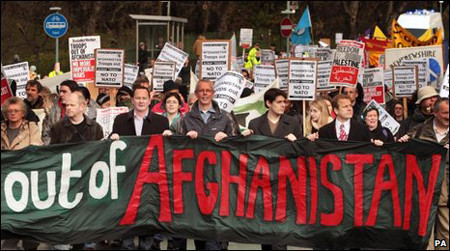By Pip Hinman
Tough talk by the warmongers at the November 20-21 NATO conference in Lisbon, Portugal, obscured the growing opposition in the US and Europe to the nine-year occupation of Afghanistan.

Hundreds of anti-war protesters demonstrated at a meeting of Nato members in Edinburgh on Sunday, 14 November 2009.
Ten thousand people took to the streets of London on November 20 to protest the war. Angry at the British government’s recent cuts to services and pensions, many carried “Cut war not welfare” placards.
The protest was organised by the UK Stop the War Coalition, the Campaign for Nuclear Disarmament and the British Muslim Initiative. It came soon after the November 17 death of Christopher Davies — the 100th British soldier killed in Afghanistan this year.
Military families led the march. Speakers included Joe Glenton, a former British soldier who served a six month jail sentence for refusing to serve in Afghanistan. He said the war was a “sham” and demanded the troops be pulled out immediately.
During the protest, Glenton returned his war service medals to the British PM’s Downing Street residence.
He told the November 20 Guardian: “This [war] isn’t about defense of our country or our liberty. What are these [soldiers] going to return to? A country that has been mutilated financially and politically.”
Ten thousand British troops are stationed in Afghanistan.
Meanwhile, a new US poll released two days before the NATO summit found 50% of US citizens opposed the war in Afghanistan.
The Quinnipiac University poll surveyed 2424 registered voters nationwide and showed that despite bipartisan support for the war, people are increasingly opposed. Sixty two percent of Democrats are opposed to the troops staying in Afghanistan.
Despite this, the NATO summit pledged to stay on in Afghanistan, while it talked of a “transfer of security” to the Afghan government in some regions from next year.
An agreement was signed with the corrupt Afghan government of Hamid Karzai to step up the US-NATO training of Afghan troops and police.
The NATO summit also included talk of a “conditions-based” transitional exit plan, which aimed to end Western troops’ combat role 2014.
At the same time, most NATO leaders and Australian PM Julia Gillard took pains to point out that combat troops would not leave Afghanistan any time soon.
But with the domestic pressure building up, British PM David Cameron said British troops would not remain after 2015. Spanish PM Jose Luis Rodriguez Zapatero said Spanish troops could pull out as early as 2012.
For her part, Gillard urged other nations to better explain the case for the war in Afghanistan — even though her own efforts have not convinced Australians. A majority of Australians still want an end to Australia’s involvement in Afghanistan.
Gillard also told Karzai he needed to do more to stamp out rampant corruption in Afghanistan.
“I certainly expressed to President Karzai that Australia wants to see continuing work on the question of fighting corruption in Afghanistan”, she told journalists at a November 20 NATO press conference.
But an Australian-owned company working in Afghanistan, Compass Integrated Security Solutions, has been accused of widespread corruption in a report presented to a US Senate committee, said the November 22 Sydney Morning Herald.
Compass has had contracts with the Australian Department of Defense in Afghanistan.
The SMH said: “The committee found Compass's guards sometimes did not turn up to convoys they were meant to protect.
“In one case ‘the guards who did show up allegedly robbed a service station along the convoy route’”.



